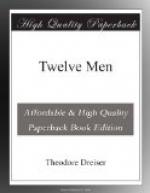Among other things at this time, the latter was, or pretended to be, immensely interested in all things pertaining to the Chinese and to know not only something of their language, which he had studied a little somewhere, but also their history—a vague matter, as we all know—and the spirit and significance of their art and customs. He sometimes condescended to take us about with him to one or two Chinese restaurants of the most beggarly description, and—as he wished to believe, because of the romantic titillation involved—the hang-outs of crooks and thieves and disreputable Tenderloin characters generally. (Of such was the beginning of the Chinese restaurant in America.) He would introduce us to a few of his Celestial friends, whose acquaintance apparently he had been most assiduously cultivating for some time past and with whom he was now on the best of terms. He had, as Peter pointed out to me, the happy knack of persuading himself that there was something vastly mysterious and superior about the whole Chinese race, that there was some Chinese organization known as the Six Companions, which, so far as I could make out from him, was ruling very nearly (and secretly, of course) the entire habitable globe. For one thing it had some governing connection with great constructive ventures of one kind and another in all parts of the world, supplying, as he said, thousands of Chinese laborers to any one who desired them, anywhere, and although they were employed by others, ruling them with a rod of iron, cutting their throats when they failed to perform their bounden duties and burying them head down in a basket of rice, then transferring their remains quietly to China in coffins made in China and brought for that purpose to the country in which they were. The Chinese who had worked for the builders of the Union Pacific had been supplied by this company, as I understood from Dick. In regard to all this Peter used to analyze and dispose of Dick’s self-generated romance with the greatest gusto, laughing the while and yet pretending to accept it all.
But there was one phase of all this which interested Peter immensely. Were there on sale in St. Louis any bits of jade, silks, needlework, porcelains, basketry or figurines of true Chinese origin? He was far more interested in this than in the social and economic sides of the lives of the Chinese, and was constantly urging Dick to take him here, there and everywhere in order that he might see for himself what of these amazing wonders were locally extant, leading Dick in the process a merry chase and a dog’s life. Dick was compelled to persuade nearly all of his boasted friends to produce all they had to show. Once, I recall, a collection of rare Chinese porcelains being shown at the local museum of art, there was nothing for it but that Dick must get one or more of his Oriental friends to interpret this, that and the other symbol in connection with this, that and the other vase—things which put him to no end of trouble and which led to nothing, for among all the local Chinese there was not one who knew anything about it, although they, Dick included, were not honest enough to admit it.




